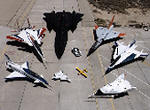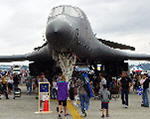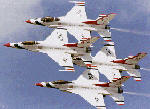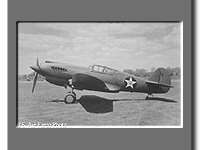
|
Description
| Manufacturer: | Curtiss |
| |
| Base model: | P-40 | ||
| Designation: | P-40 | ||
| Version: | B | ||
| Nickname: | Kittyhawk I | ||
| Designation System: | U.S. Air Force | ||
| Designation Period: | 1925-1947 | ||
| Basic role: | Pursuit | ||
| Crew: | Pilot | ||
Specifications
| Length: | 31' 9" | 9.6 m | |
| Wingspan: | 37' 4" | 11.3 m | |
Propulsion
| No. of Engines: | 1 | ||
| Powerplant: | Allison V-1710-33 | ||
| Horsepower (each): | 1040 | ||
Performance
| Max Speed: | 352 mph | 566 km/h | 305 kt |
Known serial numbers
Examples of this type may be found at
| Museum | City | State |
| National Museum of Naval Aviation | NAS Pensacola | Florida |
P-40B on display
National Museum of Naval Aviation |
Recent comments by our visitors
| Tripp Alyn Newport, RI | A brief followup: the large white numbers were only used by
the AVG (1-33 1st Sqdn, 34-66 2nd Sqdn, 67-99 3rd Sqdn.). Later AVG a/c sported 101+ numbers (like the new E-models). In WWII many fighters carried large lettering on the fuselage aft of the cockpit like "FT-G" to designate the Squadron (FT = 353FS) and the assigned pilot (G = Wallace Emmer's "Arson's Reward"). As for the markings on USAAF P-40s on Oahu, HI on 7 Dec 41, I have no info. Lts. George Welch & Ken Taylor were two of the approx. 14 American pilots who got into the air that fateful morning. Welch was officially credited with 4 kills, Taylor with 2 kills (his 2 probables were most likely kills due to later review of Japanese records. Welch & Taylor were each awarded the DSC for their bravery. Welch ended the war as a triple-ace with 16 confirmed victories, but was killed in 1954 in the crash of his F-100 during a test. Phil Rasmussen got aloft in a P-36 Hawk IN HIS PAJAMAS! and shot down a Zero, for which he was awarded the Silver Star. Tripp 03/26/2011 @ 08:47 [ref: 37109] |
| Tripp Alyn Newport, RI, RI | This is a nice historical representation of Bob Neale's a/c while he was flying with the American Volunteer Group (AVG), also known as The Flying Tigers. You can tell that it's a Curtiss-Wright B-model Tomahawk due to the 2-50cal MGs mounted in the nose, flanking the air intake (they were synchronized to fire through the propeller blades). This order of 100 P-40Bs were traded off by the Brits in return for later models (this order was originally going to the French, but was assumed by the Brits when France fell in spring, 1940). Missing is the AVG # on the tail (white characters P-8101 thru P-8200). The low sqdn. #7, green apple w/Adam,Eve & snake, & the white stripe around the empenage indicates an a/c assigned to the First Pursuit Squadron (the Adam & Eves). The famous snarling shark-
mouth insignia of the AVG was painted on the a/c on 16 Nov 1941 after Charlie Bond & Eric Shilling (both claim credit) saw the RAAF P-40 in the North African Campaign on the cover of Nov. 2nd issue of the British magazine, Illustra- ted Weekly of India while at a dinner given by Brits in Toungoo, Burma on 15 Nov. The camo paint scheme also came later as the original 100 P-40Bs were painted a dark, solid olive drab. The P-40E Kittyhawks ferried over from Africa via India appeared to have the camo paint scheme. Finally, the winged-tiger springing from the blue V was produced by the Walt Disney Studios shortly before the AVG disbandment on 4 July 42 (the logo designer was Roy Williams, who was the always jovial "Roy" on the Mickey Mouse Club TV series). Tripp 03/26/2011 @ 08:12 [ref: 37108] |
| Joe , NY | Im wondering if there was a big white number on the P 40b during the attack on Pearl Harbor? Let me know thanks and also if you have any color photo of P 40b from Pearl Harbor can you send to me so i can copy the details to model im working on thanks 04/21/2004 @ 17:57 [ref: 7257] |
| Harry Foster Edmonds, WA | The aircraft is a replica of one flown by a good friend, Bob Neale. Bob passed away in Nov. of '94. He trained a Pensecola in '38 and served on the Saratoga CV3. He also flew in the picture Dive Bomber and had a walk on part on the Sara with his good friends Hank Geselbracht and Fritz Wolf.He resigned his comission to join the AVG in Burma and China. He became a squadron leader and is credited with destroying 16 Japaneze aircraft. From my many visits with Bob over a period of 40 years I think it is very possible that he actually shot down many more aircraft than he claimed. Bob loved the Navy and in later life was sorry he hadn't made a career of the service.He flew commercial aircraft with American Overseas Airline from '42 to 50 when that company merged with Pan Am. He flew with many famous navy pilots like Bob Gailer an All American from the University of WA. I think you have one of Gailer's pre war biwing Grummans there from the Sara.Do you have any records or pictures of Bob while he trained at Pensecola or later as a naval pilot on the Sara? Thank you 08/05/2000 @ 16:04 [ref: 570] |
Recent photos uploaded by our visitors








